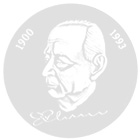For his outstanding scientific achievements and his exceptional expertise in communicating scientific findings to the broader public as well as into the policy arena
Robert Schlögl is not only an outstanding scientist with a worldwide reputation far beyond the borders of his respective discipline; he is also an excellent communicator of scientific themes – Schlögl is, so to speak, a true “ambassador of science”.
More than anyone else, Robert Schlögl possesses the ability to elucidate complex scientific-technical interrelationships and ties in an understandable and plausible manner, thus, conveying their often underestimated significance and scope. Be it in exchange with interested citizens at the “Long Night of Sciences”, as a keynote speaker in front of six hundred invited guests at the annual event of the National Academy of Science and Engineering or in a personal conversation – Robert Schlögl strives with great commitment and remarkable focus not only to explain interdependencies and to communicate important insights, but to ignite the “spark” of enthusiasm within his listeners. This he achieves almost without exception – on the one hand, because he concentrates on the essentials, and, on the other hand, because his communication is simply authentic.
Robert Schlögl designed, founded and steered the academy initiative “Energy Systems of the Future” (ESYS) for four years, which became a leading project of German science accompanying the energy revolution. From the beginning on, dialogue formats were an integral part of the project concept, initially in the form of the “Research Forum Energy Transition” and then in the form of stakeholder dialogues and interdisciplinary expert discussions. These dialogue formats have always been designed as true dialogues and not as instructive monologues. Schlögl respects the interlocutor with his likely dissenting opinion adhering to his claim that scientific knowledge is ultimately not to be denied. If this is occasionally viewed as an unreasonable demand, then Schlögl always succeeds, with a pinch of humor, in adding some truth to the matter.
Very often, Robert Schlögl clearly goes beyond “heterogeneous catalysis” – his personal discipline in chemistry – placing things in a wider context. In doing so, specific scientific findings are addressed within a larger framework and, thus, become comprehensible for outsiders. For example, Schlögl’s guiding idea of closing the carbon cycle is a good example: a vision of sustainable economic activity in terms of climate protection while fully preserving the country’s economic power.
To pick up on a sentence with which the Nobel Prize Winner, Gerhard Ludwig Ertl, amicably characterized Robert Schlögl at a symposium in honor of his 60th birthday: “He is a candle that burns at both ends.” It is never just the subject matter alone, his scientific research on an international level, which drives Schlögl to continuous highest possible performance. It is, furthermore, his concern for a sustainable future for our society; the concern for a planet that has not been left to us humans for exploitation, but rather for proper management. Robert Schlögl “burns” for a better world, in which ever-increasing knowledge on scientific-technical relationships can be conveyed and goes hand in hand with a growing social awareness of the same interrelations – for the purpose of the political shaping of a sustainable future. Robert Schlögl “burns” for this, namely “at both ends”. And for this we can thank him. With this Robert Schlögl proves to be an outstanding keeper and promoter of the German and European culture and community of values.
He is the perfect science communicator and a role model for this, at present, essential “additional function” of a research scientist – namely not only responsible for producing scientific publications, but with the mission to contribute to solving major societal challenges and to convey this input to the general public. Particularly in times of fake news, we need scientists such as Robert Schlögl. The fact that this communication task is currently being vehemently demanded by our Federal Minister of Research underlines this important task of scientists also for the political arena.
Prof. Dr. Dr. h.c. Reinhard Hüttl
DEUTSCHES GEOFORSCHUNGSZENTRUM,
Potsdam
